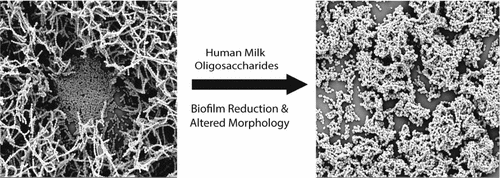当前位置:
X-MOL 学术
›
ACS Infect. Dis.
›
论文详情
Our official English website, www.x-mol.net, welcomes your
feedback! (Note: you will need to create a separate account there.)
Human Milk Oligosaccharides Exhibit Antimicrobial and Antibiofilm Properties against Group B Streptococcus
ACS Infectious Diseases ( IF 4.0 ) Pub Date : 2017-06-13 00:00:00 , DOI: 10.1021/acsinfecdis.7b00064 Dorothy L Ackerman 1 , Ryan S Doster 2 , Jörn-Hendrik Weitkamp 2, 3 , David M Aronoff 2 , Jennifer A Gaddy 2, 4 , Steven D Townsend 1, 5
ACS Infectious Diseases ( IF 4.0 ) Pub Date : 2017-06-13 00:00:00 , DOI: 10.1021/acsinfecdis.7b00064 Dorothy L Ackerman 1 , Ryan S Doster 2 , Jörn-Hendrik Weitkamp 2, 3 , David M Aronoff 2 , Jennifer A Gaddy 2, 4 , Steven D Townsend 1, 5
Affiliation

|
Streptococcus agalactiae (Group B Streptococcus, GBS) is a Gram-positive bacterial pathogen that causes invasive infections in both children and adults. During pregnancy, GBS is a significant cause of infection of the fetal membranes (chorioamnionitis), which can lead to intra-amniotic infection, preterm birth, stillbirth, and neonatal sepsis. Recently, breastfeeding has been thought to represent a potential mode of GBS transmission from mother to newborn, which might increase the risk for late-onset sepsis. Little is known, however, about the molecular components of breast milk that may support or prevent GBS colonization. In this study, we examine how human milk oligosaccharides (HMOs) affect the pathogenesis of GBS. HMOs from discrete donor samples were isolated and profiled by matrix-assisted laser desorption/ionization (MALDI) mass spectrometry (MS). Growth and biofilm assays show that HMOs from mothers of specific milk groups can modulate the growth and biofilm formation of GBS. High-resolution field-emission gun scanning electron microscopy (SEM) and confocal laser scanning microscopy confirmed the quantitative biofilm assays and demonstrated cell arrangement perturbations in bacterial cultures treated with specific oligosaccharides. These findings demonstrate that HMOs affect the growth and cell biology of GBS. Finally, this study provides the first example of HMOs functioning as antibiofilm agents against GBS.
中文翻译:

母乳低聚糖对 B 族链球菌具有抗菌和抗生物膜特性
无乳链球菌(B 族链球菌,GBS)是一种革兰氏阳性细菌病原体,可引起儿童和成人的侵袭性感染。怀孕期间,GBS 是胎膜感染(绒毛膜羊膜炎)的重要原因,可导致羊膜内感染、早产、死产和新生儿败血症。最近,母乳喂养被认为是 GBS 从母亲传播给新生儿的一种潜在模式,这可能会增加迟发性败血症的风险。然而,人们对母乳中可能支持或预防 GBS 定植的分子成分知之甚少。在这项研究中,我们研究了母乳低聚糖 (HMO) 如何影响 GBS 的发病机制。通过基质辅助激光解吸/电离 (MALDI) 质谱 (MS) 分离和分析来自离散供体样品的 HMO。生长和生物膜测定表明,来自特定乳群母亲的 HMO 可以调节 GBS 的生长和生物膜形成。高分辨率场发射枪扫描电子显微镜(SEM)和共焦激光扫描显微镜证实了定量生物膜测定,并证明了用特定寡糖处理的细菌培养物中的细胞排列扰动。这些发现表明 HMO 影响 GBS 的生长和细胞生物学。最后,这项研究提供了 HMO 作为 GBS 抗生物膜剂的第一个例子。
更新日期:2017-06-13
中文翻译:

母乳低聚糖对 B 族链球菌具有抗菌和抗生物膜特性
无乳链球菌(B 族链球菌,GBS)是一种革兰氏阳性细菌病原体,可引起儿童和成人的侵袭性感染。怀孕期间,GBS 是胎膜感染(绒毛膜羊膜炎)的重要原因,可导致羊膜内感染、早产、死产和新生儿败血症。最近,母乳喂养被认为是 GBS 从母亲传播给新生儿的一种潜在模式,这可能会增加迟发性败血症的风险。然而,人们对母乳中可能支持或预防 GBS 定植的分子成分知之甚少。在这项研究中,我们研究了母乳低聚糖 (HMO) 如何影响 GBS 的发病机制。通过基质辅助激光解吸/电离 (MALDI) 质谱 (MS) 分离和分析来自离散供体样品的 HMO。生长和生物膜测定表明,来自特定乳群母亲的 HMO 可以调节 GBS 的生长和生物膜形成。高分辨率场发射枪扫描电子显微镜(SEM)和共焦激光扫描显微镜证实了定量生物膜测定,并证明了用特定寡糖处理的细菌培养物中的细胞排列扰动。这些发现表明 HMO 影响 GBS 的生长和细胞生物学。最后,这项研究提供了 HMO 作为 GBS 抗生物膜剂的第一个例子。











































 京公网安备 11010802027423号
京公网安备 11010802027423号